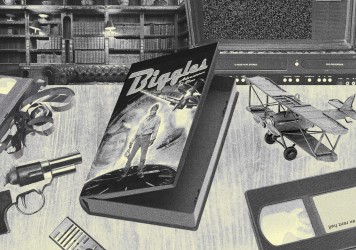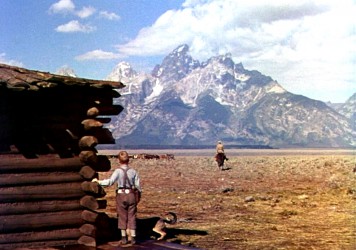
Ex-Rent Hell is a column dedicated to the seamier side of the 1980s VHS boom. Each week, ERH selects a film from this cursed era and asks one simple question: what went wrong?
Ex-Rent Hell usually prefers to do its own bandy legwork when hunting down the lame turkeys plucked for this column. But after being alerted to the dribbling, gonorrhoeal horror of Taffin by a bootleg recording of Joe ‘Hollywood’ Cornish and Adam ‘Norfolk’ Buxton’s Adam & Joe BBC6 radio show, we realised that a golden gift-horse had laid a lemon in our laps. Soon finding ourselves £0.01 (inc. P&P) the poorer, but richer in every other way, a dinged-up VHS tape (and apologetic note) winged its way in from Artie’s Artiefacts, Kalamazoo Ave, Grand Rapids, MI. Your loss, Arthur, is ERH’s cherished boon.
Pierce Brosnan is Mark Taffin (brief and immediate note to budding screenwriters – no tough-guy/hero has ever been called Mark. Mark is a name for a third-division footballer or pension advisor). Taffin is a lovable, drunken rogue/two-fisted debt collector in a small seaside town in County Wicklow. His rebellious outsider credentials are swiftly established by the posters of Johnny Cash and hard-drinking Irish snooker ledge Alex ‘Hurricane’ Higgins he has Blu-Tacked to the walls of his tumbledown (read: insanitary) farmhouse (read: cowshed). He is Robin Hood, Jesus and Shane all put together – and looks better in Ray-Bans than any of them.
Yes, whether it’s solving a piffling financial matter for the head of the local Rotary Club or helping a gang of larking teens get one over on a comedy car salesman, Taffin is up to the task. It’s a rather genial line of business in which money rarely changes hands and everything is usually cleared up by the time the pubs open. Taffin is a big-haired fish in a small, boggy pond, happy to tool around the countryside in a salmon-pink Fiat cabriolet bearing a bumper sticker that reads, ‘My Other Ride Is Your Sister!’ He’s part George Michael, part Bart Simpson, part shouty headcase, and all is well.
But when a group of Dublin businessmen – led by ‘Harry the Bastard’ – turn up with sketchily outlined plans of locating a chemical plant on the local lacrosse pitch which will “totally reinvigorate the local economy,” Taffin must become part Shaft, part Henry Kissinger and part shouty headcase in order to singlehandedly stop their fiendish plans to regenerate the community. All of which makes Taffin sound like a bizarrely motivated but competently staged inversion of Local Hero, when it is in fact a somnambulant home movie of some big lads in blousons running around the in woods, necking Guinness and wading through Wicklow’s many (and vast) Sunday lunchtime strip clubs.
Our lawyers would never allow us to ever imply that excessive alcohol consumption was part of any film’s shooting schedule, but Brosnan’s… ‘wandering attention’ and transient accent (really, even after all these years are we sure he’s Irish at all?), the fact that he habitually sports thick sunglasses during any scenes shot before lunch and a wavering performance that mixes Richard Burton surliness with Nic Cage mania all add to Taffin’s ‘Ah, feck it!’ style of filmmaking. It all comes to a head in the film’s justifiably infamous line-reading/internet meme “Then maybe you shouldn’t be living heeeeeeeeeere!!!”
Indeed, the film’s swollen Guinness budget might well be the reason that the business end of the big junkyard finale takes place entirely off-screen, with the resultant matte-painting explosion witnessed only by an old man walking his dog. It’s a sublime piece of comedy editing that, along with a late stand-up turn by Father Ted star Dermot Morgan as obnoxious ‘blue book’ comedian Mickey Botswana and the closing theme music by Chas & Dave mean that Taffin – the big bollix! – may have had the last laugh after all…
This article was originally published in LWLies 48: the Elysium issue
Published 25 May 2016

A previously lost film provides a fascinating insight into the actor’s unorthodox creative process.

Remember this culture-clash caper that told us America won the First World War?

Alan Ladd’s mysterious stranger in town fundamentally changed the way audiences believed in heroes.